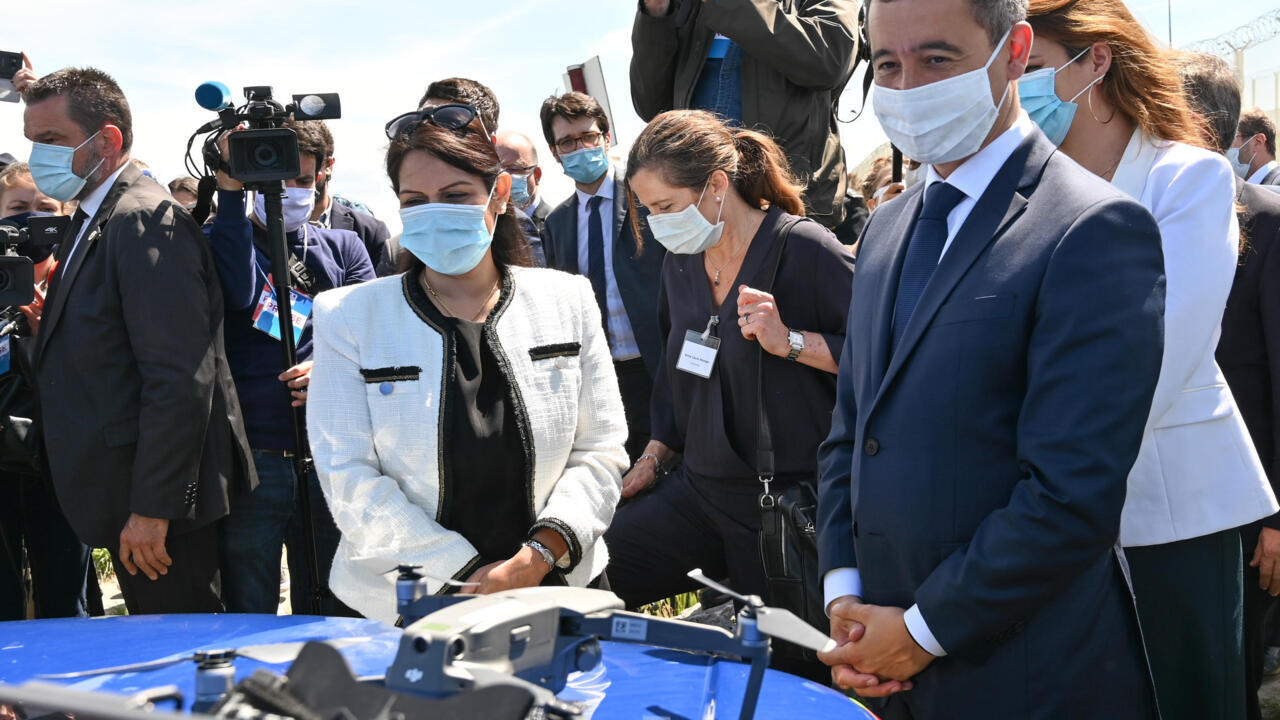
Britain's Home Secretary Priti Patel (C) and French Interior Minister Gerald Darmanin (R), wearing face masks, look at French police equipment during their visit in Calais on July 12, 2020. (Photo by DENIS CHARLET / AFP)
NGOCSTIP – Europe and Middle East Unite to Fight Human Trafficking as 29 July became a powerful moment of remembrance and resistance. Across capitals, cities, and rural areas, governments, communities, and survivors came together to raise awareness and share the voices of the silenced. From candlelight vigils in Paris to educational programs in Manama, the atmosphere was filled with urgency and resolve.
This international day offered an opportunity to not only mourn the victims but also rally support for systemic changes that prevent future suffering. Stories of resilience revealed the painful realities of modern slavery and replaced cold statistics with powerful human experiences. Survivors shared their journeys through firsthand accounts and moving art installations that illustrated the trauma and scale of exploitation. Education campaigns reached millions both online and in communities, delivering a bold message that the world refuses to ignore human trafficking. The global observance highlighted hope, unity, and decisive action as its core message.
In a historic show of cooperation, Europe and Middle East Unite to Fight Human Trafficking with coordinated campaigns, high-level dialogues, and joint statements. Nations like France, Germany, Bahrain, and the United Arab Emirates held synchronized events focused on prevention and survivor empowerment. In Brussels, an art exhibit portrayed the journey of survivors, while in Abu Dhabi, a summit of policymakers discussed cross-border legislation and shared data efforts.
The collaborative approach revealed a deeper understanding of trafficking as a transnational issue requiring united action. Officials emphasized the importance of information-sharing between law enforcement and humanitarian agencies, especially in areas with vulnerable refugee populations. Religious leaders, educators, and youth organizations were involved in shaping messages for local communities. These efforts demonstrated how combining resources, cultural perspectives, and legal frameworks could strengthen the global fight. While policies differ from country to country, the collective will to end trafficking transcended borders on this powerful day.
Survivors took center stage during the global observance, sharing their experiences to educate and inspire action. In London, a conference featured testimonies from individuals who had been trafficked for labor, sex, and domestic servitude. Their journeys revealed the emotional scars and systemic challenges faced during rescue and reintegration. Each story painted a vivid picture of human trafficking’s brutal realities and emphasized the need for comprehensive victim support systems.
Many survivors highlighted the importance of education and legal assistance, both of which are often lacking in recovery programs. Digital platforms streamed interviews, allowing audiences worldwide to connect with real human experiences. Survivor-led advocacy groups also played key roles in pushing for policy changes that prioritize human dignity. These narratives were not only courageous but also transformational, shifting the conversation from abstract concepts to lived experience. Through these personal accounts, society was reminded that every statistic hides a human life longing to be seen and heard.
Bahrain took a leading role in the Middle East during the 29 July observances. The government introduced new initiatives to strengthen worker protections and improve transparency in labor recruitment agencies. Multiple cities organized workshops to train law enforcement and social workers to recognize signs of trafficking. Faith leaders in Bahrain delivered sermons that emphasized justice, compassion, and the ethical treatment of migrants.
The country’s Human Rights Committee issued a statement reaffirming its zero-tolerance policy against trafficking and called for greater international cooperation. Youth-led organizations organized marches and digital campaigns that reached thousands, using creative expression to highlight human dignity and equality. Educational institutions joined by incorporating anti-trafficking topics into lesson plans and holding public discussions. While challenges remain, Bahrain’s active participation signaled a regional shift toward stronger protective measures and community involvement. These efforts were praised by international observers, reinforcing Bahrain’s growing role in the broader conversation around human rights and social justice.
The events of 29 July signaled more than symbolic gestures; they marked a turning point in strategy and global momentum. Europe and the Middle East unite to fight human trafficking by transforming awareness into structured frameworks that include funding, legislation, and monitoring. Moreover, national governments revise action plans to include survivor input. Meanwhile, NGOs expand outreach programs with additional support. In addition, policymakers strengthen cross-border collaboration. Therefore, the momentum built during the observance continues to influence real change. Consequently, more countries commit to long-term solutions that prioritize human dignity and justice.
Governments are integrating technology into border control systems to detect suspicious patterns and alert authorities in real time. Multiple countries are forming bilateral agreements to prosecute traffickers who operate across regions. Leaders are encouraging public-private partnerships to involve industries such as transportation and hospitality in prevention programs. These strategic efforts aim to keep the momentum of this year’s observance alive. Organizations and governments continue to amplify survivor voices and strengthen cooperation. Nations around the world are taking clear, coordinated steps toward eliminating human trafficking. The commitment shown in July must transform into consistent action and strong political resolve throughout the year.